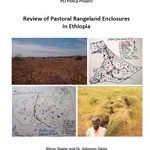Access to productive rangeland has long been a critical issue affecting pastoralists in Ethiopia. In November 2011, the Feinstein International Center at Tufts University facilitated a review of a specific set of changes to rangeland management in Ethiopia, being the establishment of rangeland enclosures. This work was conducted under the Pastoralist Livelihoods Initiative (PLI) in Ethiopia, funded by USAID and involving a consortium of non governmental organizations (NGOs) known as the PLI 2 consortium, working with government and other partners. The review considered the development of rangeland enclosures in Ethiopia and examined how different actors perceive the likely impact of enclosures on pastoralist livelihoods. Central to the review was the need to understand impact by pastoralist wealth group. The review process involved a literature review, field assessments in Borana and Somali pastoralist areas to understand current perceptions of the benefits of enclosures, particularly for poorer pastoralists, and finally, local stakeholder review workshops.
Review of Pastoral Rangeland Enclosures in Ethiopia

November 2011
ASSOCIATED PROJECT
SUBJECTS
PUBLICATION TYPE
LOCATION
RELATED PUBLICATIONS
The time pressure involved in designing and implementing anticipatory action can discourage the localization of decision-making. Learn more from a cartoon-infused summary of insights.
•
July 2024
Early Warning Systems can reduce deaths and damages caused by extreme weather events, if investors address gaps in communication and planning. Learn more from a cartoon-infused summary of insights.
•
July 2024
This synthesis report reflects upon Phase 1 findings on humanitarian action in pastoral drylands of the Greater Horn and Sudano-Sahel.
•
June 2024
This desk study examines common perceptions of pastoralism among humanitarians and barriers to international humanitarian systems meeting pastoralists’ needs.
•
June 2024
This desk study explores how state-owned policies and programs in pastoral areas of the Sudano-Sahel and the Greater Horn of Africa meet pastoralists’ needs and priorities.
•
June 2024
This desk study explores how pastoralists manage climate, conflict, and other stresses through indigenous early warning systems, preventive actions, local emergency responses, and customary safety nets.
•
June 2024






